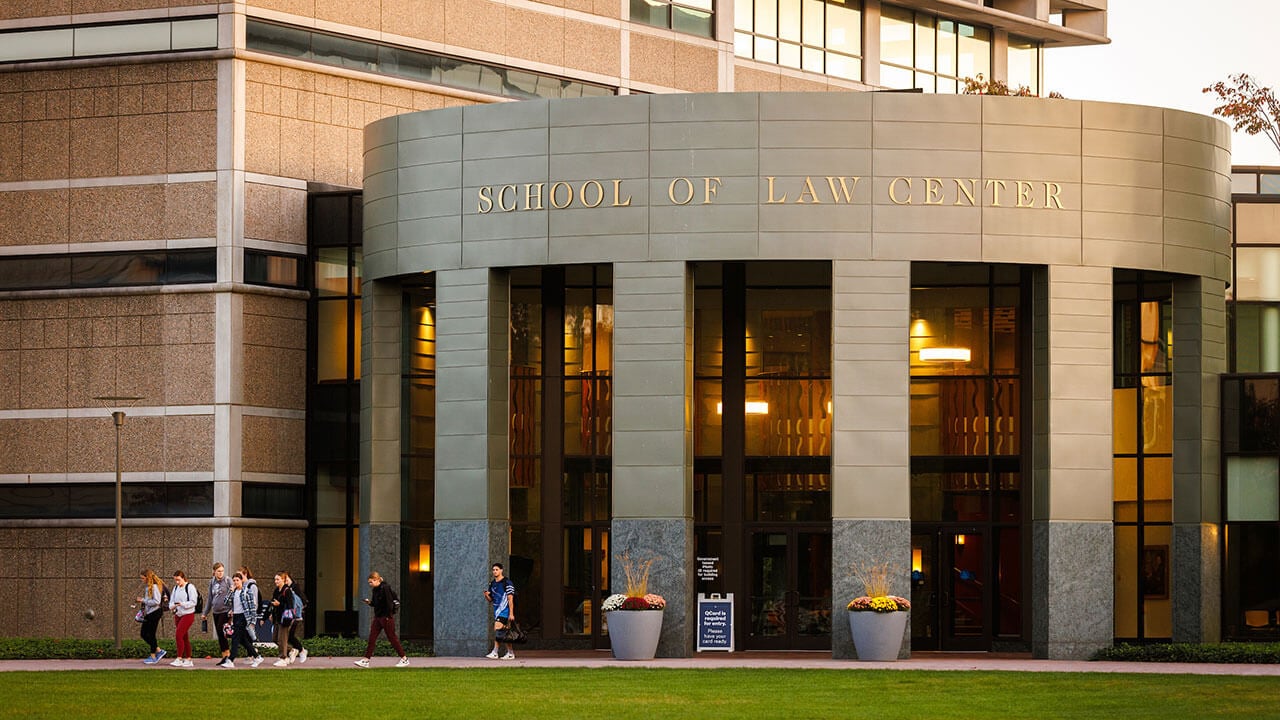
preLaw names Quinnipiac as a top school in the nation for practice-ready lawyers
April 15, 2024

April 15, 2024

Among 59 schools making the grade as preLaw’s best in the nation for practical training, preLaw ranked Quinnipiac 17th with a strong A rating. preLaw also recognized the depth and breadth of Quinnipiac’s forward-thinking dispute resolution programming with an A- rating.
Quinnipiac School of Law’s wide array of legal clinics and diverse externships are deliberately designed to give law students exceptional opportunities for impactful practical training which prepares them to be practice-ready, said Carolyn Kaas, Associate Dean of Experiential Education and Co-director of the Center on Dispute Resolution.
“One of the hallmarks of our program is to offer a diversity of options that meets what the students need,” said Kaas. “One of the things I think we’re most highly rated for is our philosophy that anything a lawyer can do in practice, you can find a way to try it out as a Quinnipiac law student, either in clinic or externship.”
Quinnipiac also offers exceptional simulation courses, another foundational building block of experiential legal education. preLaw’s practice-ready rankings looked at schools with a wide range of offerings and commitment to preparing practice-ready lawyers with clinics, externships, simulation courses, moot court and other special programs.
Quinnipiac’s clinics and externships share equal importance under the umbrella of clinical legal education, said Kaas. The School of Law offers 11 to 12 clinics per year with both narrow and broad focuses. For example, while the Tax Clinic focuses on assisting low-income taxpayers, the Civil Justice Clinic, the largest at the School of Law, allows faculty and students the opportunity to take on a diverse set of types of cases and respond to the ever-changing needs of the community.
Quinnipiac law clinic experiences create an extremely close relationship between law students and faculty. Faculty supervise cases and instruct in companion seminars. There are no more than 8 students per faculty member in a clinic.
“It is a very intense, close working relationship. It is really a mentorship,” said Kaas.
Quinnipiac’s externships match students with exceptional practical training across a range of law and judicial services which closely mirror the experiences they will encounter in practice.
“They are working side by side and very closely, with one or more lawyers, or judges, or legislators, or mediators,” said Kaas. “It is also a very intense mentorship experience.”
The School of Law also works to ensure every student secures externships that will align with their area of interest, no matter how unique.
“It’s about matching the student with what’s going to take them to the next step in their preparation,” said Kaas. “It’s determining what the student wants and what they need next and crafting and curating that educational experience for them.”
In recent years, 80 to 95 percent of every Quinnipiac School of Law Juris Doctor (JD) graduating class has completed at least one clinic/externship experience or more.
“It’s the two of them together which create our diverse tapestry of clinical legal education opportunities,” said Kaas.
In the growing field of dispute resolution, Quinnipiac’s early commitment to create outstanding opportunities to experience unique exposure and education in mediation, arbitration and negotiation put the School of Law among preLaw’s spring 2024 selection of the best in the country.
Since 1998, the Center on Dispute Resolution at Quinnipiac Law has focused on integrating the theory and practice of dispute resolution, creating opportunities for both dispute resolution professionals and law students to engage in dialogue and attend training to develop knowledge and skills.
“The fact that we have a Center on Dispute Resolution which is both inward facing to our JD and outward facing to both the state of Connecticut and the national community to grow dispute resolution is great and it benefits our students,” said Kaas.
Dispute Resolution is one of the nine concentrations at Quinnipiac School of Law.
“It’s extremely well regarded and popular with the students,” said Kaas.
Simulation courses, international arbitration and new cutting-edge philosophies in dispute resolution, such as the integrated law approach to negation, are just a few of among a deep bench of topics of study in the concentration, together with opportunities in dispute resolution clinics and externships.
Built on a foundation of legal history, Quinnipiac School of Law recognizes the importance of looking to the future to help mold students attuned to practice readiness, said Kaas.
“At Quinnipiac, we are looking ahead to what it takes to be a lawyer,” said Kaas. “We are looking to the future. We’re educating people who are going to walk out the door and work closely with clients.”
Quinnipiac Today is your source for what's happening throughout #BobcatNation. Sign up for our weekly email newsletter to be among the first to know about news, events and members of our Bobcat family who are making a positive difference in our world.
Sign Up Now